#dissecting how the Lion's negging works is a great exercise in understanding manipulation honestly
Explore tagged Tumblr posts
Text
Did Laios have a plan
... when he made his deal with the Lion? How much of it was intentional and how much of it was out of his control?
Well. If I'm being honest I don't really want to try and provide a definitive answer to that question, because I think the ambiguity is, itself, part of the story. I've gone back and forth a few times myself, and I don't think either category - "fully intentional" or "fully coincidence" - is entirely true.
That being said, I would like to point out a few things that I've seen taken for granted as true. Things that, imo, are much more about the character's perspective, or about what the character WANTS people to think (well, that's really just the Winged Lion).
Consider this not exactly an argument for "Laios masterminded everything from the start and saved the world with his cunning," but more... "Laios considered what he was doing more than people give him credit for." Make sense?
Alright then, let's go:
So to start with, I want to show every time (that I could find, at least) that the question of 'does Laios have a plan' gets brought up. This is specifically after his Ultimate Monster Form is revealed, to be clear - the question isn't about if he has a plan in general, it is if he has/had a plan when he made this specific deal with the Lion.
Here they are:
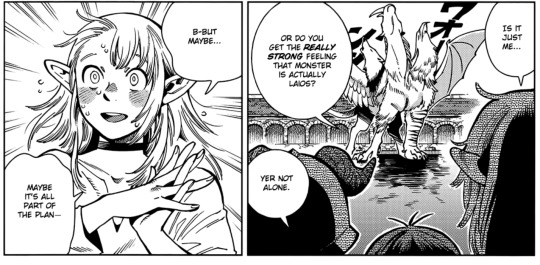
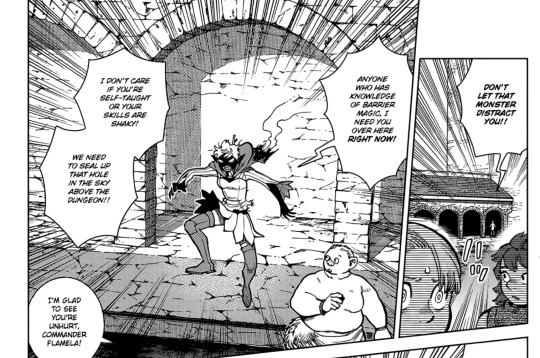
-

-

You'll notice, in all of these instances, there never really is an answer given to the question. Either because there is no way to get one, or, with Kabru at the end there, because he explicitly doesn't let Laios answer. There's even a bit of an arc here: we start with a sort of desperate 'I've mostly given up but maybe this isn't as bad as it looks,' then get a more optimistic 'maybe we really are saved,' and finally end on 'it all worked out in the end, so we maybe don't need to know.'
But, as much as there is some genuine growth in Kabru's 'accept the outcome, rather than dissecting the truth,' I also think it says a lot more about him than about Laios. Kabru is the one trying to handle his questions and his uncertainty - as he said, he wants to confirm his judgement of character. He wants to feel like he had control over things.
And he lets that go! But he also doesn't actually get the truth, either, and his implied assumption here (that Laios, the wide-eyed monster-lover, probably just followed his desires), still relies on his judgements and assumptions about Laios.
But okay, these bits are all focused on the characters theorizing about Laios. How about we look at the character who actually tells us the facts ("facts"): the Winged Lion.
The Winged Lion has quite a bit to say about Laios and his monster form.
He says that Laios hates humanity, and would rather be a monster

I've talked about this a bit already, but the Lion makes a lot of claims and assumptions about Laios that aren't necessarily true.
First of all, let's just make sure we clearly establish that the Lion is being manipulative here. That may seem obvious, but it's important to understand that there is a difference between 'the truth' and 'a version of the truth specifically framed to prey upon your deepest shame and insecurities about what you really want.'
To point out a few quick-and-dirty contradictions here:
If Laios really hated all other humans, then the Lion wouldn't hinge so many of his other arguments on Laios' love for Falin and his friends.
the Lion claims that Laios "[doesn't] even care enough about the future of [the] world to express an opinion about it," even though Laios has literally expressed opinions on what he wants for the world, to the Lion's face.
In general, the Lion does not make a distinction between urges and choices (see, for instance: him using Marcille's subconscious fear of the canaries as a way to keep her from stopping the monsters from attacking in chapter 86).
I'm not saying there is not a piece of truth here, but also... we are not our darkest thoughts, and we especially are not those thoughts as defined by someone who wants to hurt and control us.
But let’s move on to the stuff the Lion claims about Laios once he has been turned into his monster form.
2. He says that (or rather, acts like) Laios is under his control
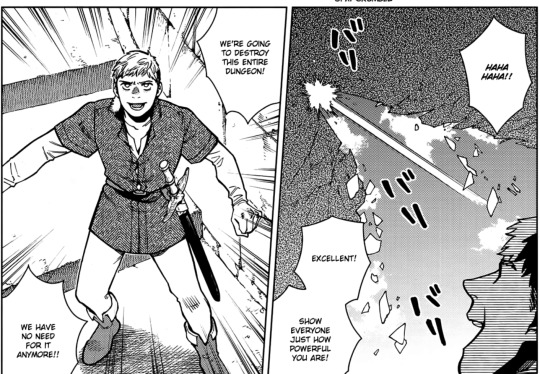
The Lion really enjoys grandstanding about how Monster Laios is an ultimate tool he has control over. He gloats about making Laios fight the others, and has him smash through the magical barrier.
But smashing the barrier is kinda the only thing that Monster Laios actually does for the Lion. He doesn't attack anyone. He doesn't hurt his friends, despite Chilchuck thinking that Laios has "turned completely into a monster." And he certainly doesn't simply let the Lion go through with his plan to eat everyone.
This barrier smashing is actually an interesting and odd thing for Laios to have done specifically, so remember that one. I'll come back to it later.
But, yeah, to the original point... despite the Lion's dramatics, all that Monster Laios does is pose, smash up a magic barrier, and then eat him. Not exactly under his control.
AND SPEAKING OF EATING THE DEMON...
3. He frames Laios attacking and eating him as thoughtlessly violent

This one is pretty funny to me, and the Lion keeps it up for the whole scene. I'm not sure how much of this is his genuine understanding of the situation, and how much is him intentionally framing things in the most insulting manner, but like... truly. The ego involved in this. To see someone who has, multiple times, tried to stand against you - someone who has literally wished for your non-existence, to your face - to see this person attack you, specifically, and have your first reaction be 'huh, I guess he's a reckless weirdo to the core???'
Incredible stuff.
And this part, too:
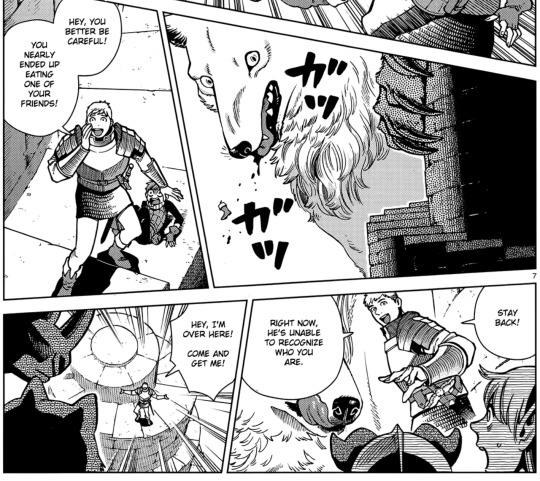
He claims that Laios can't recognize anyone, that he's out of control. And yet, the Lion is the only person that gets eaten here. He is Laios' singular target.
Hell, Laios even specifically attacks one of the bodies that is actively hurting Chilchuck. I don't know if that was entirely intentional on Laios' part, but I do think it's notable.
The Lion torments Laios' friend, and when Laios does something that interrupts that action, the Lion reframes it as unhinged violence. I don't know, there's something here about the way that cruel people only talk about the things people do to resist them as violent, and ignore the violence that causes such resistance in the first place.
In any case, the main point is that the Lion insists on treating Laios like an unthinking animal during this fight, despite the fact that Laios is clearly trying to accomplish something here.
And what exactly is Laios trying to accomplish? Well, the Lion isn't entirely wrong. Laios is trying to eat something. He tells us as much.


And truly, everything Laios does as a monster points to this. He had a goal. And he accomplished it.
Let me back up a moment. I need to explain smashing the barrier.
So, Laios first starts considering how to kill the Lion when he is confronted with the fact that his only other choice would be to kill Marcille. Immediately and entirely discarding that solution, because of course he does, he tries to wrap his head around what defeating the Lion would even look like.

He clearly continues thinking about this, as a nearly identical conversation happens a few chapters later, when Laios is once again told that killing Marcille is the only way forward.
Only, this time, he's started to come up with an idea for how to do this impossible thing.
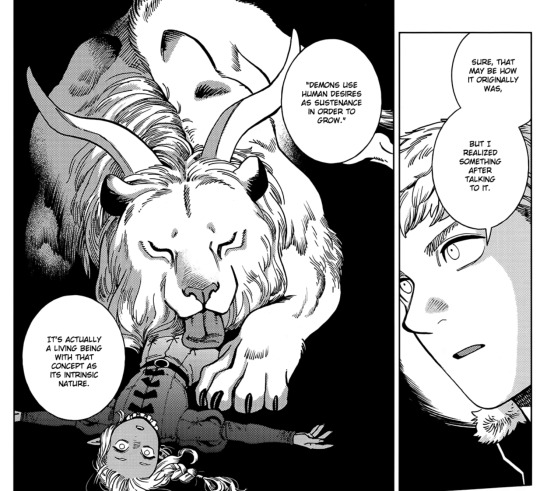
Harkening all the way back to the Living Armor chapter, Laios draws on the same lesson - if the Lion has made itself part of the world, if it has made itself into something alive, that means he can kill it. And eat it.
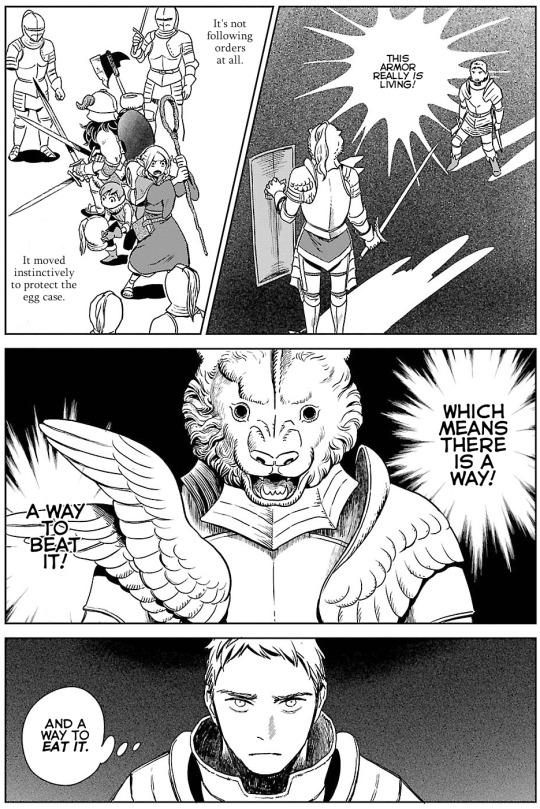
But there's an important extra detail to this. If he's going to try and kill (and eat) the Lion, he needs to strike when it’s vulnerable. He needs to strike when it's eating.
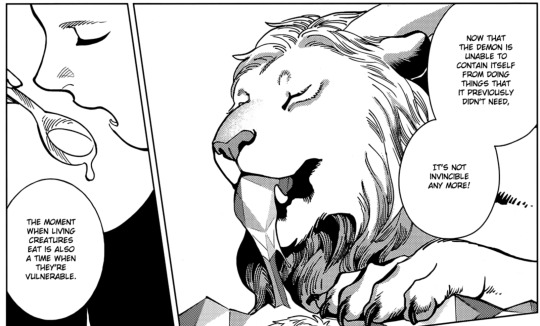
This is why he smashes through the barrier. Again, nothing else he does as a monster really benefits the Lion. He doesn't attack anyone else. The only command he obeys is to smash the barrier. Because the Lion has to think he has won for Laios to be able to eat him.
Beat him. For Laios to be able to beat him.
The question of why Monster Laios wanted to eat the Lion is, I think, the most ambiguous part. Was he curious? Hungry? Did he fight for his own life, for his friends, or for all of humanity? Did he know how to win because he had planned everything from the start, or because he was driven by an unquenchable instinct to do whatever it took to survive?
I don't know that it is possible to say for sure. But I do know that the Lion underestimates Laios, through it all. He underestimates Laios as a human, and he underestimates Laios as a monster.
And in the end, after he is bested, even then I don't think the Lion ever gets Laios. I don't think he understands how much Laios means his words about the Lion being burdened by hunger...
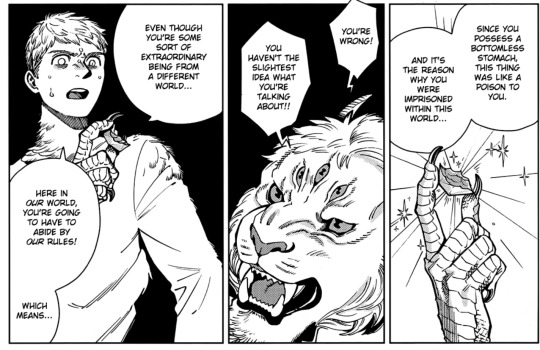

or what Laios cares about most...


or what meaning there is in life, for him.


So I don't buy what the Lion is selling about Laios, generally speaking. I don't buy that Laios didn't ever know what he was doing, and I don't buy that he was nothing more than a hungry beast.
Well. I mean. He was a hungry beast. But he was a more than that too. He was the Devourer of All Things Horrible. And he didn't just happen into that title by chance.
#dungeon meshi#delicious in dungeon#laios touden#winged lion#dissecting how the Lion's negging works is a great exercise in understanding manipulation honestly#dungeon meshi spoilers#dunmeshi analysis
1K notes
·
View notes